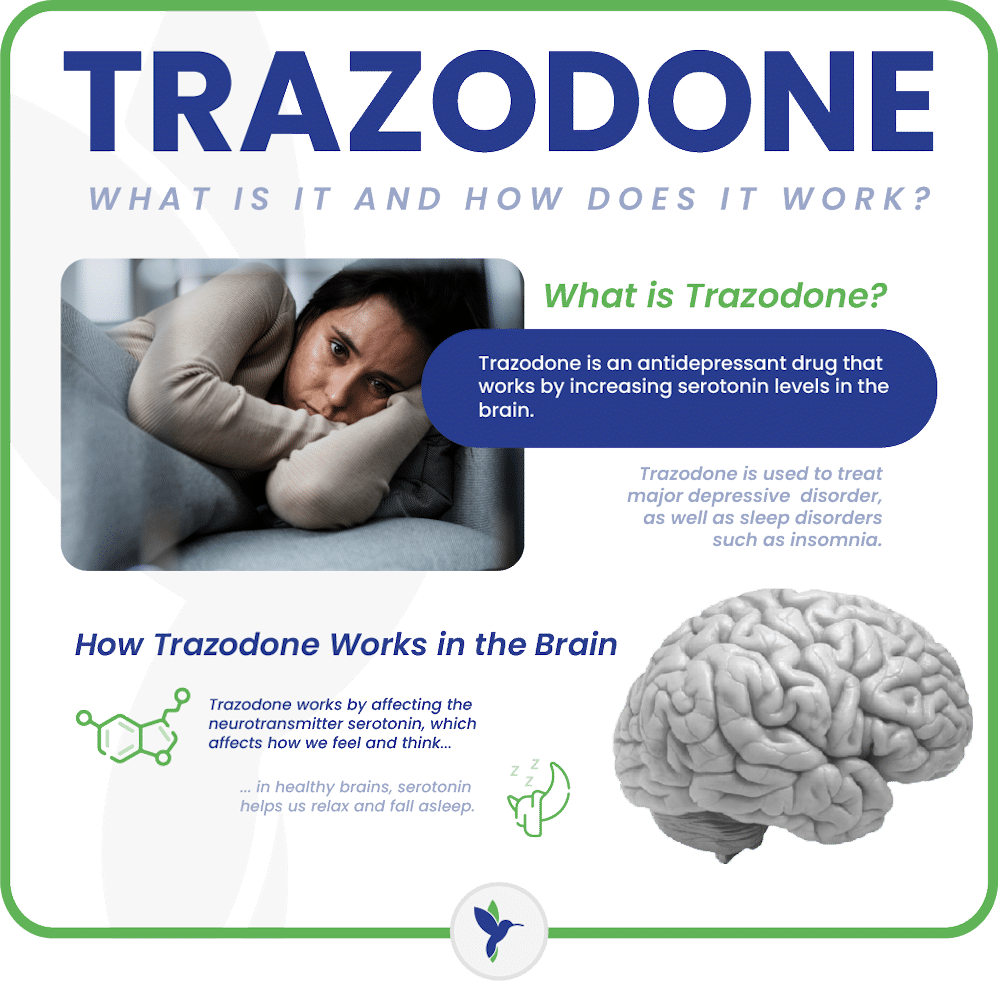Trazodone is an antidepressant that treats depression. It is also used to treat sleep disorders. However, patients should always take the medication as directed by their doctor. Taking too much of the medication could cause serious side effects. One potential danger is that trazodone could be habit-forming or addictive.
What is Trazodone?
Trazodone is an antidepressant drug that works by increasing serotonin levels in the brain. It is also used to treat sleep disorders such as insomnia.
People who take this medicine should avoid alcohol while on it. Side effects of consuming alcohol while on trazodone include confusion, hallucinations, fast heartbeat, seizures, low blood pressure, or fainting.
When taken over a long period of time, trazodone can cause dependence. People who need to take antidepressants for extended periods of time are at risk of physical dependence and addiction. These patients should discuss tapering off the medication with their doctor.
The Effects of Trazodone
Trazodone has been shown to cause some side effects, including drowsiness, dry mouth, constipation, dizziness, headache, nausea, vomiting, nervousness, restlessness, sweating, trouble sleeping, and urinary retention. These side effects usually go away after several weeks of treatment. However, serious side effects could occur, such as increased blood pressure and heart rate. If you experience any of these symptoms, stop taking the drug immediately and consult your doctor.
There are other effects of trazodone reported by people using the drug. Some of them include:
- Increased appetite
- Dizziness when getting up from lying down
- Feeling tired during the day
- Difficulty falling asleep at night
- Blurred vision
Trazodone Side Effects and Warnings
Tell your doctor before taking trazodone if you’ve had a stroke, heart attack, or seizures. Also, tell your doctor if you have liver disease, kidney problems, diabetes, thyroid conditions, depression, bipolar disorder, or suicidal thoughts or plans.
Trazodone can interact with certain medications, causing dangerous changes in blood sugar, electrolytes, and body weight. Your doctor will monitor you closely while you’re taking trazodone to make sure there are no interactions between the two drugs.
It’s not recommended for use by pregnant women or nursing mothers because of the risk of birth defects or for children younger than 12 years old due to safety concerns.
How Does Trazodone Work?
Trazodone works by affecting the neurotransmitter serotonin. Serotonin affects how we feel and think. In healthy brains, serotonin helps us relax and fall asleep. The body produces serotonin naturally. But sometimes the amount produced isn’t enough. That’s why many people use drugs like Prozac (fluoxetine) to help boost serotonin production.
When someone takes trazodone, the drug increases the amount of serotonin available in the brain. As a result, the person feels less anxious and depressed.
Can Trazodone be Habit-Forming or Addictive?
According to the Food and Drug Administration (FDA), if you stop taking trazodone abruptly, you may experience some unpleasant side effects.
It is important to understand what the terms “habit-forming” or “addictive” mean. Trazodone can be habit-forming or addictive even if you aren’t physically dependent on trazodone or experience withdrawal.
Difference Between Trazedone as Habit-Forming vs. Addictive
- Habit-forming means that once you start using a certain product, you will want to continue using it. You’ll find yourself wanting to take it every day, even though you don’t really need it.
- Addiction means that you’re unable to control your impulses, and it’s a serious problem. The causes of addiction include genetics, environment, or even brain chemistry.
Trazodone vs. Xanax
Xanax (alprazolam) causes similar side effects as trazodone but makes people more alert than sleepy. For instance, Xanax makes people more talkative and energetic than trazodone.
Other differences between trazodone and Xanax include:
- Trazodone comes in tablet form, whereas Xanax comes in capsule form.
- Trazodone treats depression and sleep disorders; Xanax treats anxiety.
- Trazodone is usually taken twice daily, whereas Xanax is usually taken once daily.
- Trazodone is an antidepressant, whereas Xanax is an anti-anxiety medication.
If you notice any unusual changes in behavior after starting trazodone, call your doctor right away.
Prescription Drug Addiction Treatment in South Florida
Prescription drugs like trazodone can be habit-forming and addictive. If you or a loved one are concerned about an addiction to prescription drugs like trazodone, Ambrosia Treatment of South Florida is here to help. We offer addiction treatment for all substances, including prescription medications. Call or visit our admissions page today.





